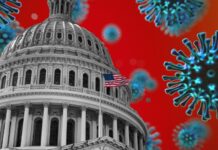Charlie is a 7-year-old Golden Retriever who knows there’s something different about Tuesdays. For starters, her dog walker comes earlier than usual, and deposits Charlie back home by early afternoon. A bag appears out of the closet, and Charlie’s favorite stuffed animal is placed in it, along with a sandwich bag full of dog treats and an empty water bowl. Charlie knows something’s up and knows what that something is. When her owner calls her name, Charlie is on her feet, barreling down the stairs, out the front door and toward the car, which she remembers will transport her an hour south on the highway to a parking lot two blocks from the political science department of a New England university.
She knows the drill. There is a university security guy who must have had a Golden as a boy, because he waits for her every week, and before the hatchback is open, he is out of his car and heading over, calling, “Charlie! I missed you!” The fellow just turned 50, but you’d never know it by the way he gets on the ground in the parking lot, his face glued to the dog’s until order can be restored.
Down the sidewalk Charlie goes with her tail wagging over the familiarity of it all, students streaming over to ask if they can pet her. Charlie makes it clear not only that they can but that they’d better, mushing her head between the legs of everyone who stops, besotted with everyone as everyone is besotted with her. It takes some time to get down the street.
When she finally does, Charlie recognizes the receptionists in the lobby of the political science department and, weeping with emotion, takes her leash in her mouth as the sidewalk scene is repeated.
Here is what the faculty and the students in the department know by now: some dogs are wary, some prone to agitation, some diffident. Charlie is a lover, and she loves every human being who so much as makes a move in her direction, unreservedly and, frankly, indiscriminately. And if you don’t make a move in her direction, she will assume it was an oversight.
Charlie proceeds to “office-surf,” trotting down the hall to visit every faculty member who happened to leave their office door open. It’s clear from the tail movement that she expects her arrival to be the best thing that could have happened to everyone concerned.
On to class. If the idea is that Charlie’s presence can help create a warm setting, Charlie embraces the mission with gusto. She makes the rounds of the students before picking a (seemingly) random spot on the floor, usually on someone’s feet, and eventually falls into a deep sleep, the stuffed animal stuffed between her paws and in her mouth. Every once in a while, someone will get up and come over to stroke her. This seems to please Charlie, but it is equally possible that by this point she’s oblivious. Two and a half hours later, dog and friends say their goodbyes until the following week.
Last week U.S. Surgeon General Vivek Murthy issued an “Advisory on Our Epidemic of Loneliness and Isolation,” reporting that even before COVID-19, 50% of American adults experienced significant feelings of loneliness. There is, he said, “an underappreciated public health crisis that has harmed individual and societal health.” According to Murthy, more than one in five adults are living with mental illness — and more than one-third of all young adults do.
As if there were much doubt about it, study after study has shown that interacting with animals decreases stress, lowers blood pressure, reduces loneliness, increases feelings of social support and just simply improves moods. From the National Institutes of Health to the American Psychiatric Association, the data is clear.
Charlie is not what you’d call “data-driven.” But she knows who she likes, and that’s everyone. They don’t call them man’s best friend for nothing.































